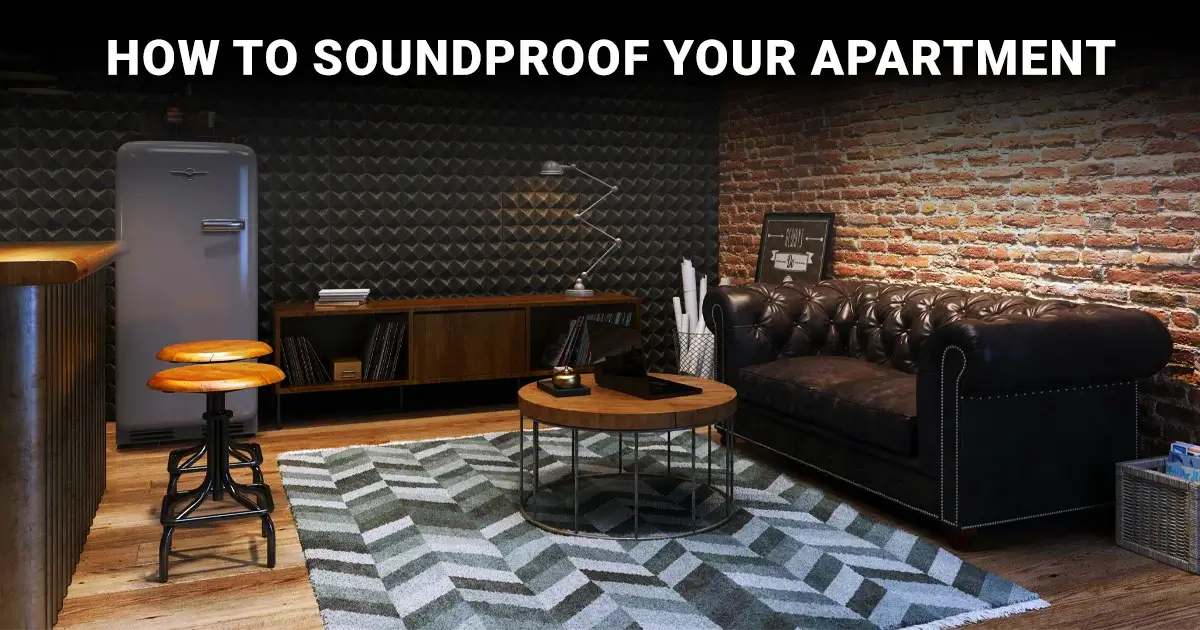City life has a lot of advantages, like better access to offices, entertainment, and amenities; however, one disadvantage is noise. Outside noises, including honks, construction noises, loud neighbours, and busy markets, have all become a part of our modern living. Unfortunately, this intrusion not only irritates but also disturbs sleep, concentration, and even health in the long run.
Homes that are high-density or in proximity to highways suffer from this problem eternally. The reason a householder or tenant wanted to know how to soundproof a room from outside noise was becoming more and more pressing.
At least easy home remedies indirectly show high efficiency in clearing the way for open soundproofing, simple DIY fixes to advanced structural improvements are all possible solutions to creating a calm indoor environment.
See also: Monsoon Safety Tips for Home: Best Maintenance Guide for 2025
Why Soundproofing Matters?
Noise pollution can really disrupt the natural order of anything. Environmental noise has an unhealthy effect on the human body and mind, leading to:
- Poor sleep quality
- Stress
- Low productivity
- Lack of concentration
One might wonder, therefore, as to how soundproofing techniques may really work and whether such solutions could compensate for traffic noise emanating from highways. Well, of course, that inquiry is just an avenue to other ideas, especially among homeowners and even tenants, as they consider how to soundproof their apartment.
This is the moment when one starts looking for the right kind of curtains or insulation. A bit confusing, isn’t it? The first stage of soundproofing is knowing how and where noise enters your space. Without this knowledge, one may spend a lot on expensive architectural fixes without achieving the desired sound-and-silence experience.
Assessing the Source of Noise
Noise can seep into your home through various channels, and by securing these weak spots, you’d be able to select an appropriate approach. The most common noises are:
Windows: Windows are generally the weakest link when it comes to traffic or street noise.
Doors: Sound leaks easily through any gaps left around hollow-core doors.
Walls and ceilings: Thin walls, especially in apartments, and shared ceilings are great conductors of noise from neighbouring units.
Floors: Floor vibrations and footfalls traverse through uninsulated coverings.
Identifying where the disturbance is loudest will help you apply the most suitable techniques for blocking it. Let us start with the most vulnerable: the windows.
Soundproofing Windows
Your windows would be the weakest link if your house is placed near any busy road, interstate highway, or railway. Therefore, this would be the first consideration to greatly elevate the noise levels indoors.
a) Get Your Windows Replaced with Double- or Triple-Glazed Glass Sometimes
Acoustically treated double-glazed windows will block a substantial amount of noise coming from the outside.
b) Use Window Inserts
If you cannot replace the windows, consideration may be given to using removable window inserts as a secondary barrier.
c) Seal Gaps and Cracks
Even small gaps around the frames allow noise in a fair bit of it, so it is a great idea to acoustically caulk them shut or weatherstrip them.
d) Install Soundproof Curtains
Thick, lined curtains absorb sound while supplementing structural measures.
Windows may be the main source of unwanted sound, though another common entry point is, indeed, doors.
See also: Water Shortage in Bangalore 2025: Causes, Affected Areas and Solutions
Soundproofing Doors
Hollow-core doors permit a lot of sound transmission. There is something that can be done regarding this:
- Replace them with solid-core doors, which have a much better capacity for blocking noise.
- Place door sweeps and attach seals for gaps at the bottom and sides.
- Install sound blankets or add acoustic panels to enhance coverage.
You should see a big difference when you add support to windows and doors. However, if you live in an apartment with thin walls, you’ll likely have to go extreme.
Strengthening Walls and Ceilings
Thin walls are actually a very common problem in apartments. So, if you are asking “how to soundproof a room from outside noise?“, then you’re really focusing on this.
That also includes:
– Acoustical panels to absorb sound waves and dampen echoes.
– Mass-loaded vinyl beneath the drywall.
– More layers of drywall with applicable soundproofing compounds.
– Ceiling insulation or acoustic tiles for overhead disturbances.
Airborne noise goes through the walls and ceilings, but what about vibrations that come through the floor? This brings us to the next level of defence.
Soundproofing Floors
Indeed, for apartments, footsteps from the upper floors and vibrations can also be disruptive. For instance:
- Thick carpets or rugs that absorb impacts and bouncing noises.
- Acoustic underlayments under flooring, which would reduce transmission.
- Floating floor type for professional-grade soundproofing.
Outdoor noise cannot be excluded despite treating the interiors. Thus, even a sound source outside needs to be dealt with.
See also: Corner House vs Middle House: Better Choice for Comfort, Value & Resale in 2025
Outdoor Noise Reduction

If you are near the highway or main roads, you probably have the question: “How to reduce highway noise in the backyard?” Here are a few helpful strategies:
- Construct a solid barrier or wall: Dense barriers reflect sound.
- Use landscaping: Trees and hedges will absorb and scatter noise.
- External sound barrier: These panels provide outdoor acoustic solutions for traffic-heavy areas.
These outdoor defences support indoor soundproofing, while apartment dwellers require more flexible methods.
How to Soundproof Your Apartment?
For rental units, building alterations are often frowned upon. Hence, the real importance of “How can you soundproof apartments near ORR traffic in India?”
Realistically, for a tenant, you can do the following:
- Hang heavy curtains and blinds over large windows.
- Put in portable acoustic partitions to suit directional noise control.
- Consider noise-cancelling devices or white noise machines to cover up some external noise.
- Use removable weather stripping, which seals the gaps but does not create a permanent alteration.
Example: Due to honks and traffic, apartments near the Outer Ring Road (ORR) in Bengaluru face a constant battery of noise. Tenants use layered curtains, seal window gaps, and portable noise machines for some respite—only these methods are allowed under most lease agreements.
Now, what if you own the property and want something more permanent?
Soundproof Entire Homes
For the homeowner who asks, “How do I soundproof my house against traffic?” the holistic concept is best:
- Personalized solution for acoustic insulation by a professional on walls, ceilings, and floors
- Smart architecture keeping bedrooms away from walls facing the road
- Roof upgrades for better control over overhead noise and rain clatter
- This holistic resolution tackles current noise issues as well as future-proof this home against increasing urban sound levels.
Cost considerations
Soundproofing solutions can be bought at variable prices depending on their complication:
- Low-budget DIY quick fixes: carpets, curtains, weather stripping (₹2,000 – ₹10,000)
- Mid-budget: window inserts, acoustic panels (₹15,000 – ₹50,000)
- High-budget professional installation: double-glazing, wall insulation, floating floors (above ₹1 lakh)
Ideal to start with the cheaper fixes, consider their improvement and then work towards more cemented solutions, if necessary.
See also: Property Price Trends in Bangalore 2025: Growth, Drivers & Future Outlook
Other Tips for Quieter Life
Some additional lifestyle changes may help:
- Put bookcases and wardrobes against the wall that hush the sound.
- Maintain your windows and doors well to prevent sound from leaking into the space.
- Introduce mesmerizing ambient sounds created by indoor fountains or a white noise application.
Noise pollution is a constant hassle of modern living; however, it does not imply the suffocation of an individual’s home environment. It can give rise to simple solutions such as sealing gaps and using curtains, but may also extend into highly sophisticated interventions, like acoustic insulation and double-glazing.
Be it in case of traffic noise with an apartment neighbor through shared walls or highways with a backyard, soundproofing is the best possible way to convert your home to a quiet peaceful retreat.
Soundproofing is much more than convenience; it is indicative of one’s sleep and focus, productivity, and overall wellbeing.



